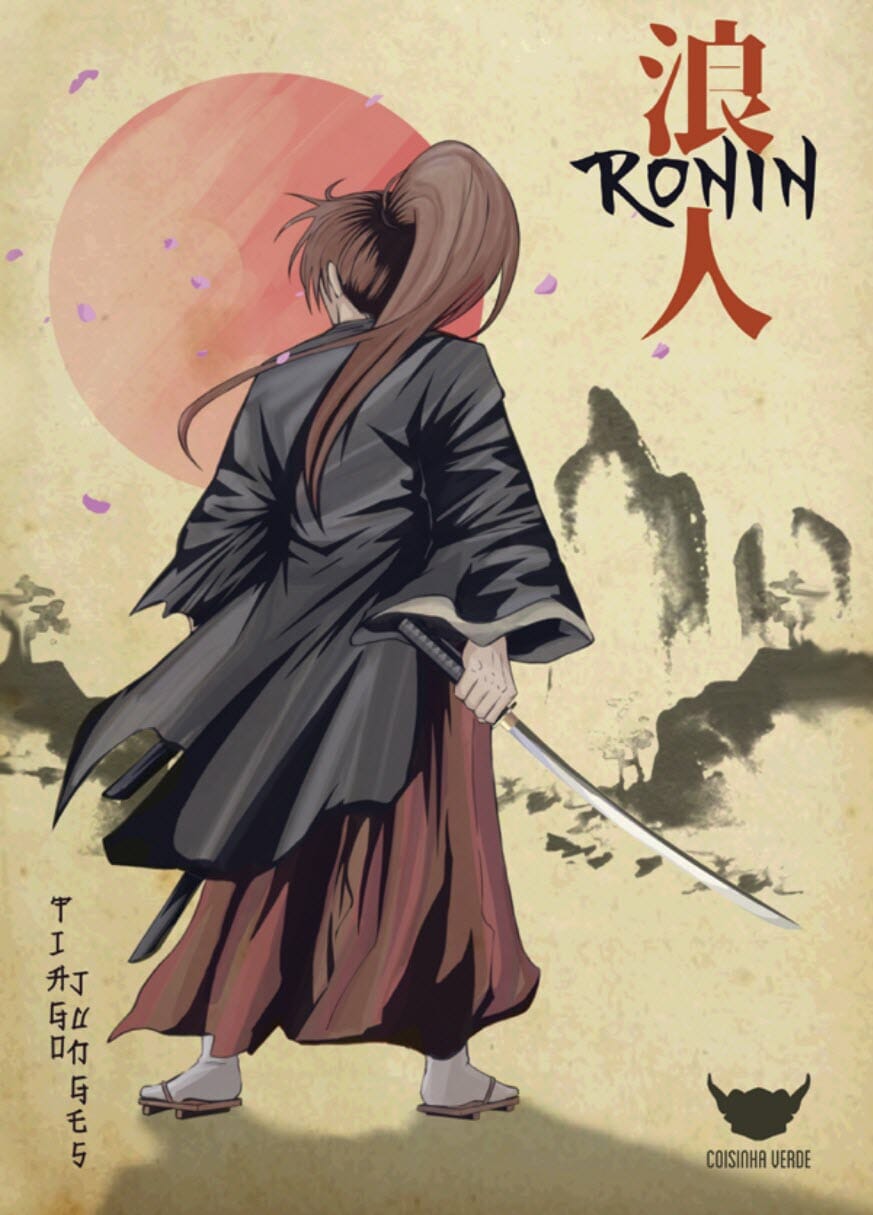Ronin is a solo RPG from Cosina Verde.
The game is available as a Name Your Own Price from Itch.io. I paid the recommended $5 and don’t regret it, but I did have a wobble during the first few pages.
Ronin is a simple concept. The dice and your imagination determine what happens to your roaming Ronin. Hopefully, you can write it down in a journal or a format that appeals to you and produce a keepsake.
As the name implies, Ronin is inspired by feudal Japan, the shogunate era, and the Sengoku period. The Daimio rule, the samurai, enforce and the peasants work. It’s a fictional Japan; you don’t need historical knowledge, although the game invites you to map it on if you have it by changing the clan names.
Your character is at the bottom of that list of people, below even the peasants. Your wanderer is a former Samurai who is now an outcast, having lost their honour. What exactly happened to put you in this state is up to the dice and your imagination.
Ronin’s system
Reputation, compassion and determination are the three stats the game uses and each range from 0 to 6. Each one is critical as the system uses simple d6 vs d6 rolls to determine outcomes, and being able to add your stat to the dice roll is statistically pretty significant.
The game ends once you’ve fought, and beaten, three villains. There’s a table to consult at that point and, if your stats are good enough, your Ronin may feel as if they have done enough to retire in peace. This the best possible outcome, and I found it hard to achieve.
To get to these villain fights, your Ronin must walk routes (dice rolls) to destinations (dice rolls) and deal with whatever happens there. Ronin provides prompts, and you fill in the details.
There’s a structure, though, beyond the yin and yang dice of conflicts. There are four types of people you can encounter; Ally, Possible Ally, Enemy and Villain. The difference between the last two is the significance; Villains move you towards the end goal, but Enemies are just potential fights.
Your chances of encountering Villains go up as your character develops.
There are four possible actions you can do as well, but not with all four NPC types. Your actions are Talk, Charm, Intimidate or Fight. You might be able to Intimidate an Enemy into running away, but you cannot do it to a Villain.
Success or failure on these actions will influence what happens next, and death is a possible, albeit unfortunate outcome, in a fight.
Ronin’s value for money

My download file from Itch was called Ronin_eng2.pdf, and this was my first clue that English was not writer Tiago Junges’ first language. A dot-com-br address at the end of the download lets me know they’re based in Brazil. You’ll hardly notice, but when you do, it’ll likely be in the first few pages and only due to slightly odd word choices and phrases.
However, I did mention I had a wobble as I started to read Ronin. After that excellent front cover, we quickly move on to a standard and stark white background with black text. A page of backers, presumably from a crowdfunding campaign, gets the ball rolling with tiny font squeezed together.
There’s a recovery as the index looks great. Art, seven chapters and 32-pages. That looks like good value! But then, as we go through the basics, it’s all text and tables. It doesn’t quite hit that $5 mark for a roll and write game in that there are better-looking games for less.
The turnaround is swift, though. The art begins to flow back, the levels of detail grow, and the tables become more impressive and comprehensive. Ronin matures from a solo RPG that was starting to feel skimpy and into a game that feels robust, helpful, thoughtful and complete.
It’s not just the art. I especially like the dice tables; they’re clean and crisp using d6 icons that just work.
You have the advantage in most situations. You’ll be able to apply bonuses more often than most of the NPCs you’ll encounter, and even a small boost gives you a pretty substantial upper hand. However, the catch is the danger of finishing too early and defeating the Final Villain before your Ronin feels as if they have done enough. Overall, I think the system is appropriate as the focus here is creating a story of a Ronin and their destiny, not their fall from grace and then their death on a dirt road somewhere in the countryside.
Overall

I’m chalking Ronin up as another successful experiment in my initial steps to explore Roll and Write and solo RPGs.
Checking out future Cosina Verde branded tabletop games is absolutely on my watch list now. However, is Ronin quite good enough to turn into a weekend writing ritual that becomes a public project over the months? Not quite. I think it’s more a rainy Sunday morning distraction, a way to wake up the mind or distract it by tickling your imagination.
Quick Links
- Download Ronin.


